Reflection on Business Communication Theories and Skills
VerifiedAdded on 2022/09/29
|6
|1330
|23
Homework Assignment
AI Summary
This assignment is a reflective paper on the student's learning experience in a business communication module. The student discusses key concepts such as the foundation of communication, written communication (including academic vs. professional writing), interpersonal and intercultural communication, teamwork, effective meetings, critical thinking, and public speaking. The paper highlights the importance of business communication for professional and personal development. The student then delves into two key theories: the cognitive dissonance theory, its application in business, and the organizational information theory. The reflection also covers the student's difficulties, performance, and the overall impact of the module on their skills and career aspirations. The paper concludes by emphasizing the significance of business communication in organizational success and its role in fostering positive relationships and achieving competitive advantage. The student reflects on how the knowledge gained will contribute to their future career development.
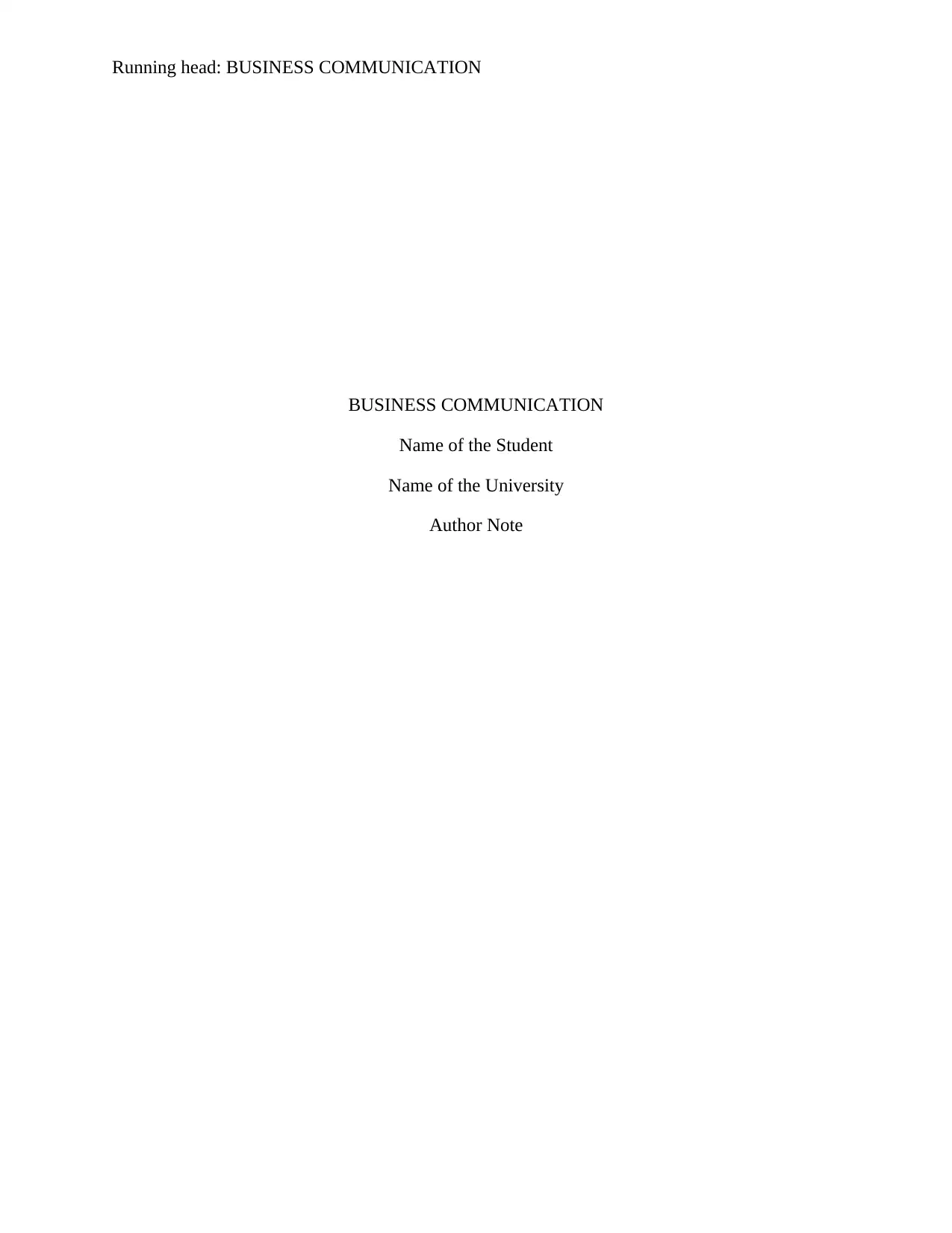
Running head: BUSINESS COMMUNICATION
BUSINESS COMMUNICATION
Name of the Student
Name of the University
Author Note
BUSINESS COMMUNICATION
Name of the Student
Name of the University
Author Note
Paraphrase This Document
Need a fresh take? Get an instant paraphrase of this document with our AI Paraphraser
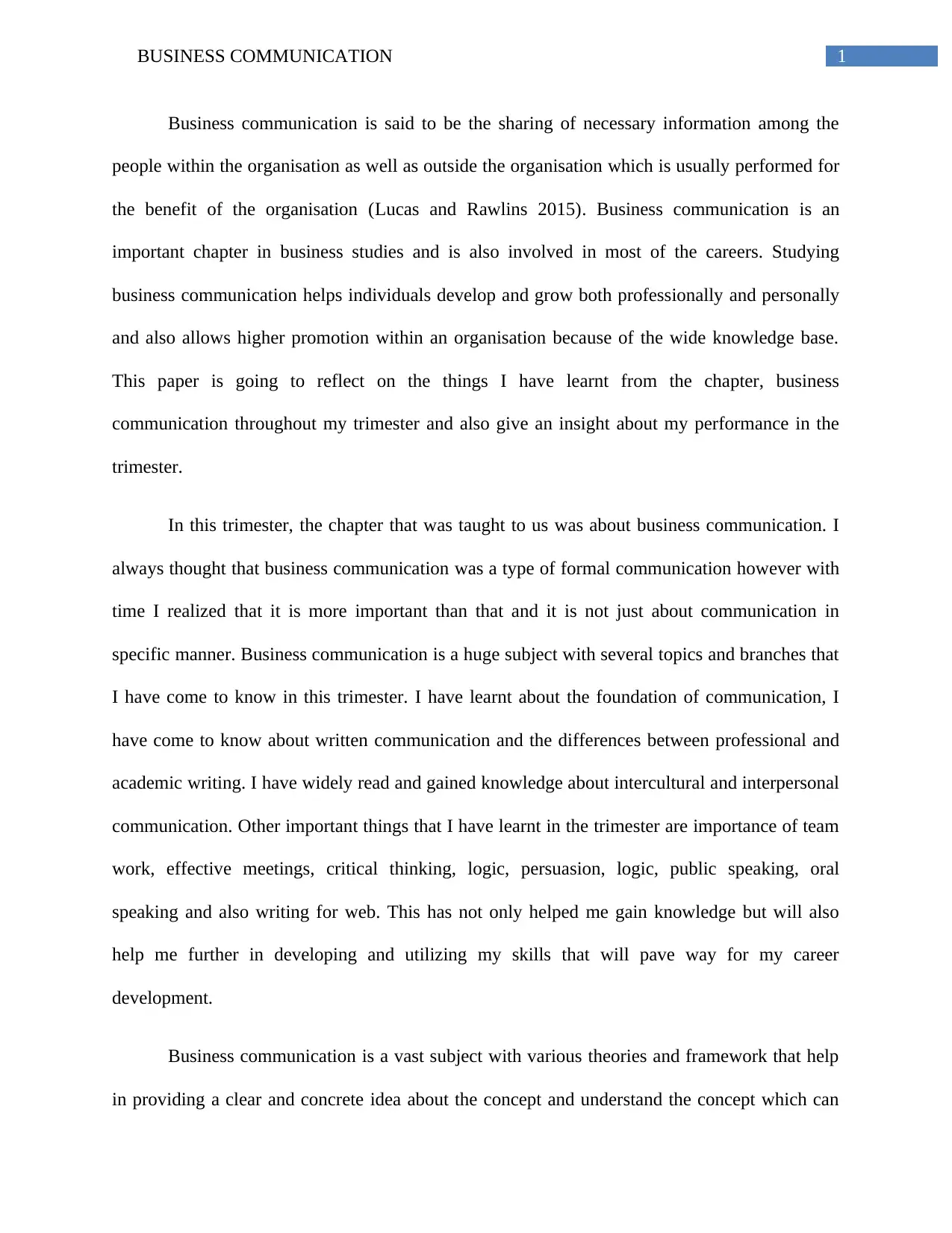
1BUSINESS COMMUNICATION
Business communication is said to be the sharing of necessary information among the
people within the organisation as well as outside the organisation which is usually performed for
the benefit of the organisation (Lucas and Rawlins 2015). Business communication is an
important chapter in business studies and is also involved in most of the careers. Studying
business communication helps individuals develop and grow both professionally and personally
and also allows higher promotion within an organisation because of the wide knowledge base.
This paper is going to reflect on the things I have learnt from the chapter, business
communication throughout my trimester and also give an insight about my performance in the
trimester.
In this trimester, the chapter that was taught to us was about business communication. I
always thought that business communication was a type of formal communication however with
time I realized that it is more important than that and it is not just about communication in
specific manner. Business communication is a huge subject with several topics and branches that
I have come to know in this trimester. I have learnt about the foundation of communication, I
have come to know about written communication and the differences between professional and
academic writing. I have widely read and gained knowledge about intercultural and interpersonal
communication. Other important things that I have learnt in the trimester are importance of team
work, effective meetings, critical thinking, logic, persuasion, logic, public speaking, oral
speaking and also writing for web. This has not only helped me gain knowledge but will also
help me further in developing and utilizing my skills that will pave way for my career
development.
Business communication is a vast subject with various theories and framework that help
in providing a clear and concrete idea about the concept and understand the concept which can
Business communication is said to be the sharing of necessary information among the
people within the organisation as well as outside the organisation which is usually performed for
the benefit of the organisation (Lucas and Rawlins 2015). Business communication is an
important chapter in business studies and is also involved in most of the careers. Studying
business communication helps individuals develop and grow both professionally and personally
and also allows higher promotion within an organisation because of the wide knowledge base.
This paper is going to reflect on the things I have learnt from the chapter, business
communication throughout my trimester and also give an insight about my performance in the
trimester.
In this trimester, the chapter that was taught to us was about business communication. I
always thought that business communication was a type of formal communication however with
time I realized that it is more important than that and it is not just about communication in
specific manner. Business communication is a huge subject with several topics and branches that
I have come to know in this trimester. I have learnt about the foundation of communication, I
have come to know about written communication and the differences between professional and
academic writing. I have widely read and gained knowledge about intercultural and interpersonal
communication. Other important things that I have learnt in the trimester are importance of team
work, effective meetings, critical thinking, logic, persuasion, logic, public speaking, oral
speaking and also writing for web. This has not only helped me gain knowledge but will also
help me further in developing and utilizing my skills that will pave way for my career
development.
Business communication is a vast subject with various theories and framework that help
in providing a clear and concrete idea about the concept and understand the concept which can
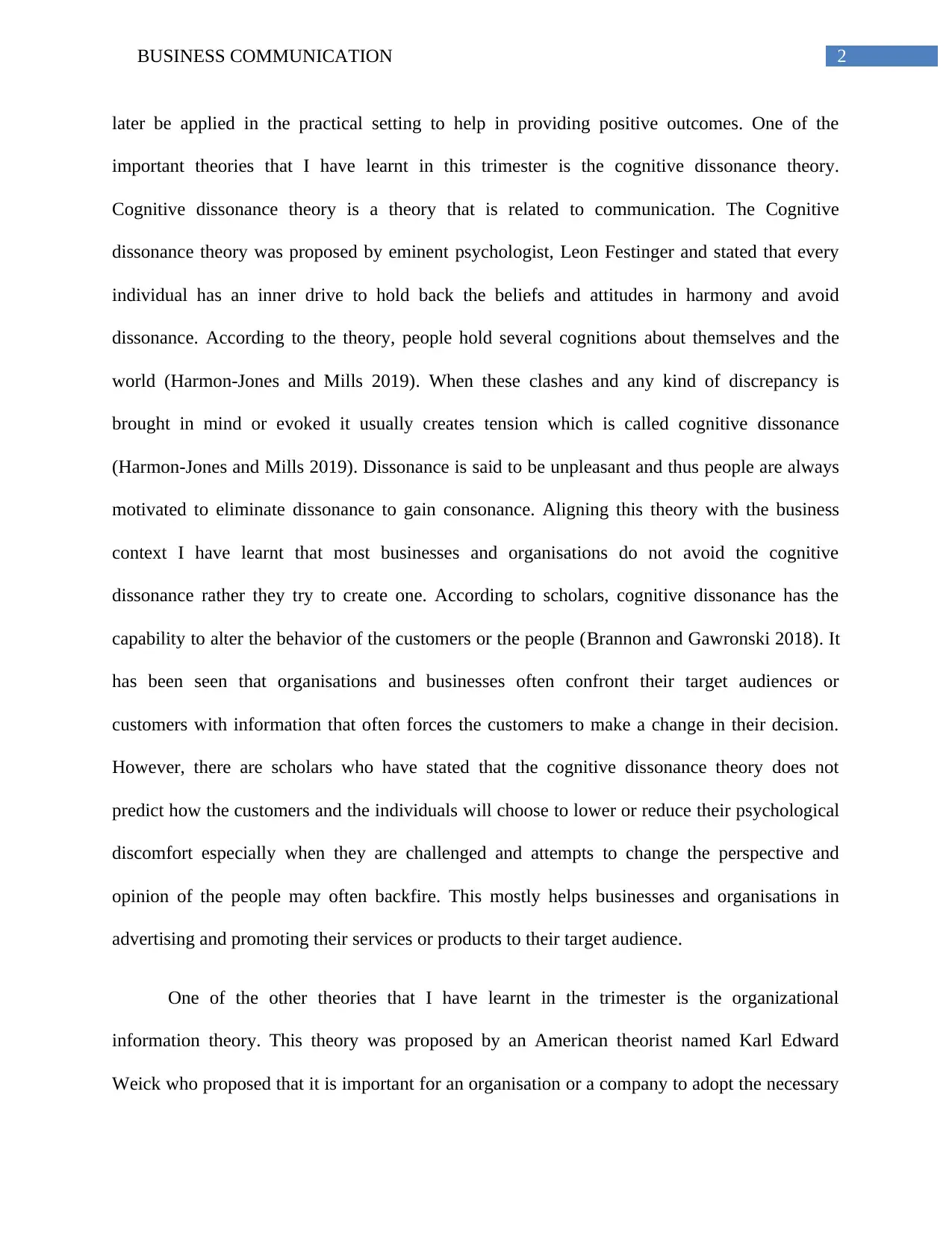
2BUSINESS COMMUNICATION
later be applied in the practical setting to help in providing positive outcomes. One of the
important theories that I have learnt in this trimester is the cognitive dissonance theory.
Cognitive dissonance theory is a theory that is related to communication. The Cognitive
dissonance theory was proposed by eminent psychologist, Leon Festinger and stated that every
individual has an inner drive to hold back the beliefs and attitudes in harmony and avoid
dissonance. According to the theory, people hold several cognitions about themselves and the
world (Harmon-Jones and Mills 2019). When these clashes and any kind of discrepancy is
brought in mind or evoked it usually creates tension which is called cognitive dissonance
(Harmon-Jones and Mills 2019). Dissonance is said to be unpleasant and thus people are always
motivated to eliminate dissonance to gain consonance. Aligning this theory with the business
context I have learnt that most businesses and organisations do not avoid the cognitive
dissonance rather they try to create one. According to scholars, cognitive dissonance has the
capability to alter the behavior of the customers or the people (Brannon and Gawronski 2018). It
has been seen that organisations and businesses often confront their target audiences or
customers with information that often forces the customers to make a change in their decision.
However, there are scholars who have stated that the cognitive dissonance theory does not
predict how the customers and the individuals will choose to lower or reduce their psychological
discomfort especially when they are challenged and attempts to change the perspective and
opinion of the people may often backfire. This mostly helps businesses and organisations in
advertising and promoting their services or products to their target audience.
One of the other theories that I have learnt in the trimester is the organizational
information theory. This theory was proposed by an American theorist named Karl Edward
Weick who proposed that it is important for an organisation or a company to adopt the necessary
later be applied in the practical setting to help in providing positive outcomes. One of the
important theories that I have learnt in this trimester is the cognitive dissonance theory.
Cognitive dissonance theory is a theory that is related to communication. The Cognitive
dissonance theory was proposed by eminent psychologist, Leon Festinger and stated that every
individual has an inner drive to hold back the beliefs and attitudes in harmony and avoid
dissonance. According to the theory, people hold several cognitions about themselves and the
world (Harmon-Jones and Mills 2019). When these clashes and any kind of discrepancy is
brought in mind or evoked it usually creates tension which is called cognitive dissonance
(Harmon-Jones and Mills 2019). Dissonance is said to be unpleasant and thus people are always
motivated to eliminate dissonance to gain consonance. Aligning this theory with the business
context I have learnt that most businesses and organisations do not avoid the cognitive
dissonance rather they try to create one. According to scholars, cognitive dissonance has the
capability to alter the behavior of the customers or the people (Brannon and Gawronski 2018). It
has been seen that organisations and businesses often confront their target audiences or
customers with information that often forces the customers to make a change in their decision.
However, there are scholars who have stated that the cognitive dissonance theory does not
predict how the customers and the individuals will choose to lower or reduce their psychological
discomfort especially when they are challenged and attempts to change the perspective and
opinion of the people may often backfire. This mostly helps businesses and organisations in
advertising and promoting their services or products to their target audience.
One of the other theories that I have learnt in the trimester is the organizational
information theory. This theory was proposed by an American theorist named Karl Edward
Weick who proposed that it is important for an organisation or a company to adopt the necessary
⊘ This is a preview!⊘
Do you want full access?
Subscribe today to unlock all pages.

Trusted by 1+ million students worldwide
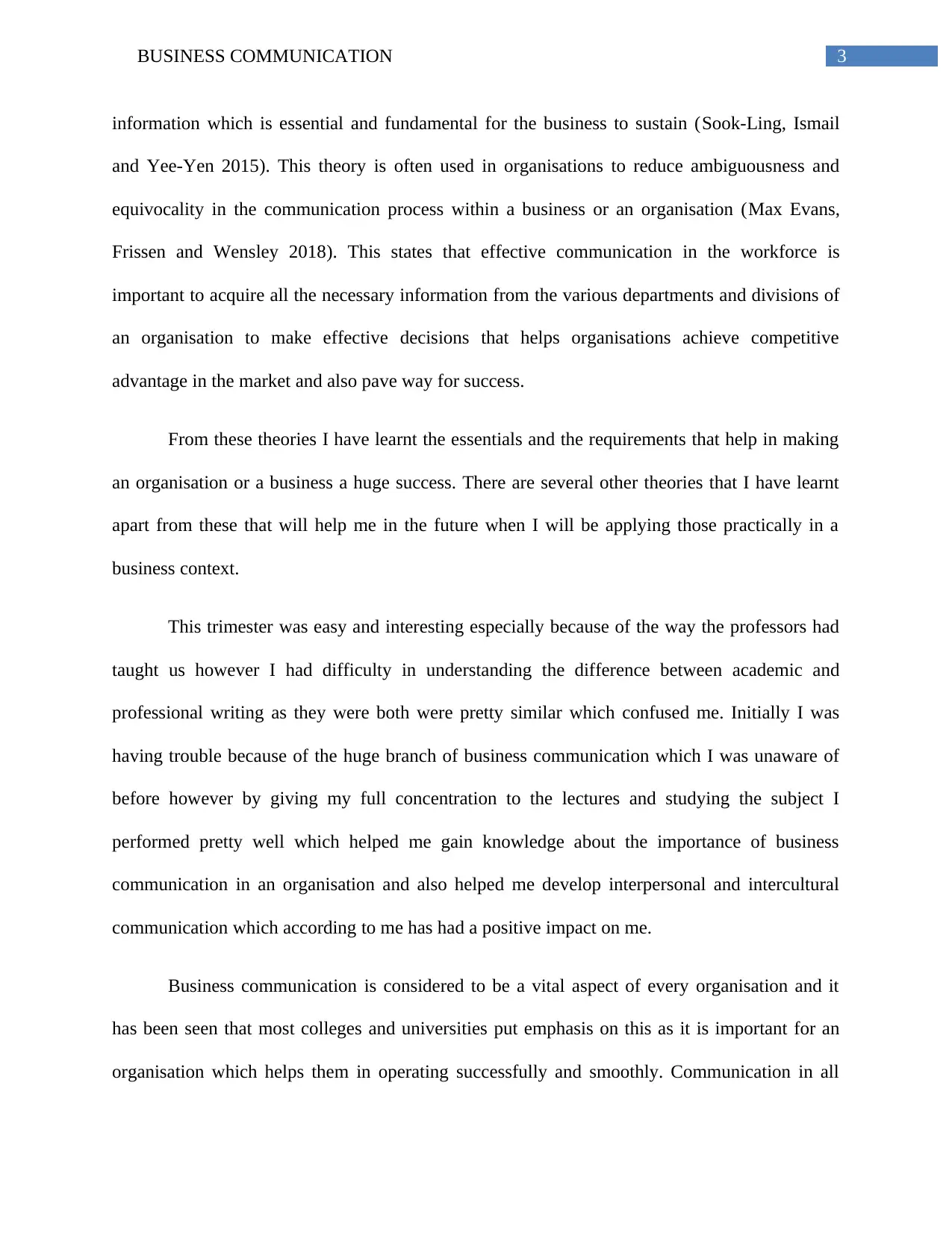
3BUSINESS COMMUNICATION
information which is essential and fundamental for the business to sustain (Sook-Ling, Ismail
and Yee-Yen 2015). This theory is often used in organisations to reduce ambiguousness and
equivocality in the communication process within a business or an organisation (Max Evans,
Frissen and Wensley 2018). This states that effective communication in the workforce is
important to acquire all the necessary information from the various departments and divisions of
an organisation to make effective decisions that helps organisations achieve competitive
advantage in the market and also pave way for success.
From these theories I have learnt the essentials and the requirements that help in making
an organisation or a business a huge success. There are several other theories that I have learnt
apart from these that will help me in the future when I will be applying those practically in a
business context.
This trimester was easy and interesting especially because of the way the professors had
taught us however I had difficulty in understanding the difference between academic and
professional writing as they were both were pretty similar which confused me. Initially I was
having trouble because of the huge branch of business communication which I was unaware of
before however by giving my full concentration to the lectures and studying the subject I
performed pretty well which helped me gain knowledge about the importance of business
communication in an organisation and also helped me develop interpersonal and intercultural
communication which according to me has had a positive impact on me.
Business communication is considered to be a vital aspect of every organisation and it
has been seen that most colleges and universities put emphasis on this as it is important for an
organisation which helps them in operating successfully and smoothly. Communication in all
information which is essential and fundamental for the business to sustain (Sook-Ling, Ismail
and Yee-Yen 2015). This theory is often used in organisations to reduce ambiguousness and
equivocality in the communication process within a business or an organisation (Max Evans,
Frissen and Wensley 2018). This states that effective communication in the workforce is
important to acquire all the necessary information from the various departments and divisions of
an organisation to make effective decisions that helps organisations achieve competitive
advantage in the market and also pave way for success.
From these theories I have learnt the essentials and the requirements that help in making
an organisation or a business a huge success. There are several other theories that I have learnt
apart from these that will help me in the future when I will be applying those practically in a
business context.
This trimester was easy and interesting especially because of the way the professors had
taught us however I had difficulty in understanding the difference between academic and
professional writing as they were both were pretty similar which confused me. Initially I was
having trouble because of the huge branch of business communication which I was unaware of
before however by giving my full concentration to the lectures and studying the subject I
performed pretty well which helped me gain knowledge about the importance of business
communication in an organisation and also helped me develop interpersonal and intercultural
communication which according to me has had a positive impact on me.
Business communication is considered to be a vital aspect of every organisation and it
has been seen that most colleges and universities put emphasis on this as it is important for an
organisation which helps them in operating successfully and smoothly. Communication in all
Paraphrase This Document
Need a fresh take? Get an instant paraphrase of this document with our AI Paraphraser
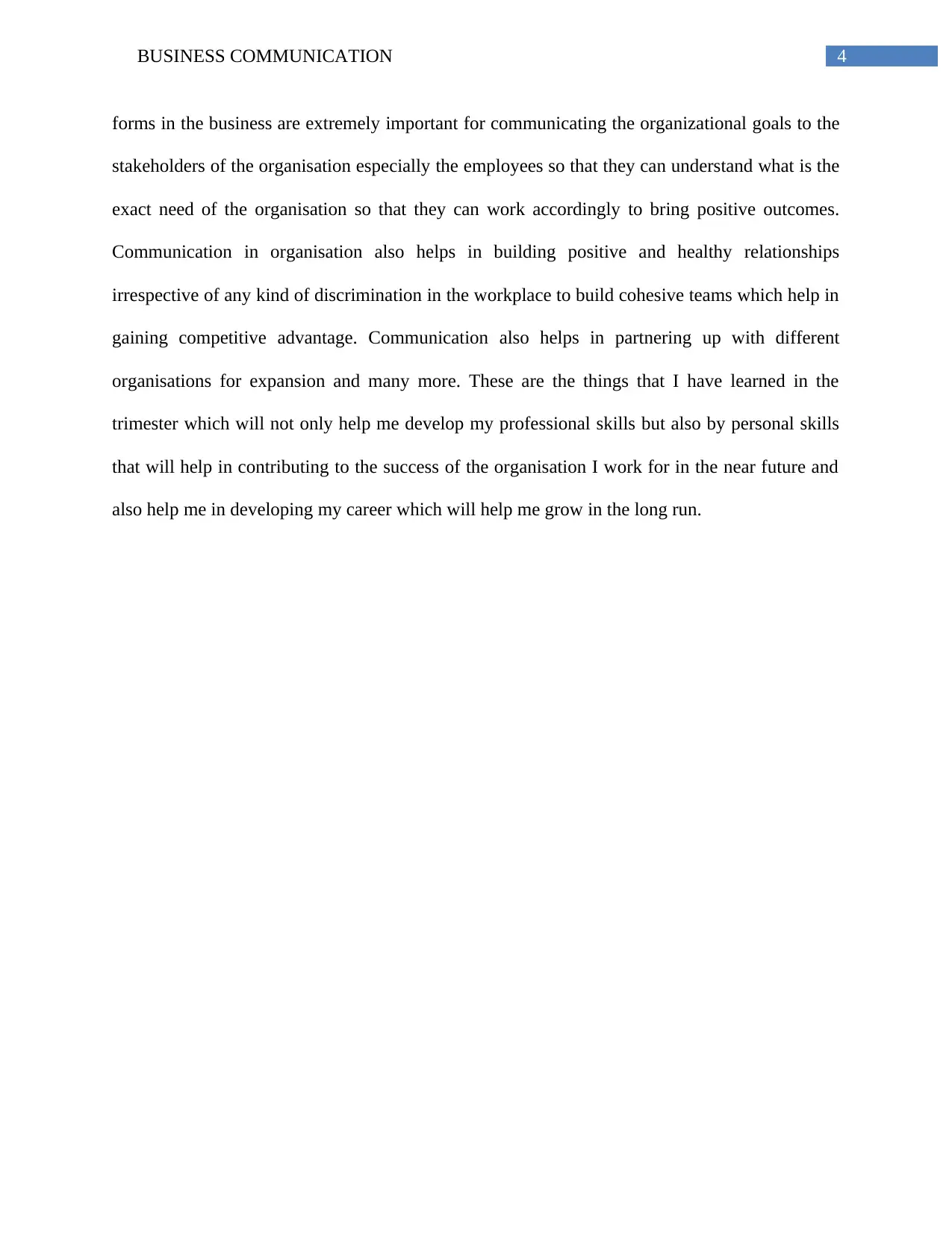
4BUSINESS COMMUNICATION
forms in the business are extremely important for communicating the organizational goals to the
stakeholders of the organisation especially the employees so that they can understand what is the
exact need of the organisation so that they can work accordingly to bring positive outcomes.
Communication in organisation also helps in building positive and healthy relationships
irrespective of any kind of discrimination in the workplace to build cohesive teams which help in
gaining competitive advantage. Communication also helps in partnering up with different
organisations for expansion and many more. These are the things that I have learned in the
trimester which will not only help me develop my professional skills but also by personal skills
that will help in contributing to the success of the organisation I work for in the near future and
also help me in developing my career which will help me grow in the long run.
forms in the business are extremely important for communicating the organizational goals to the
stakeholders of the organisation especially the employees so that they can understand what is the
exact need of the organisation so that they can work accordingly to bring positive outcomes.
Communication in organisation also helps in building positive and healthy relationships
irrespective of any kind of discrimination in the workplace to build cohesive teams which help in
gaining competitive advantage. Communication also helps in partnering up with different
organisations for expansion and many more. These are the things that I have learned in the
trimester which will not only help me develop my professional skills but also by personal skills
that will help in contributing to the success of the organisation I work for in the near future and
also help me in developing my career which will help me grow in the long run.
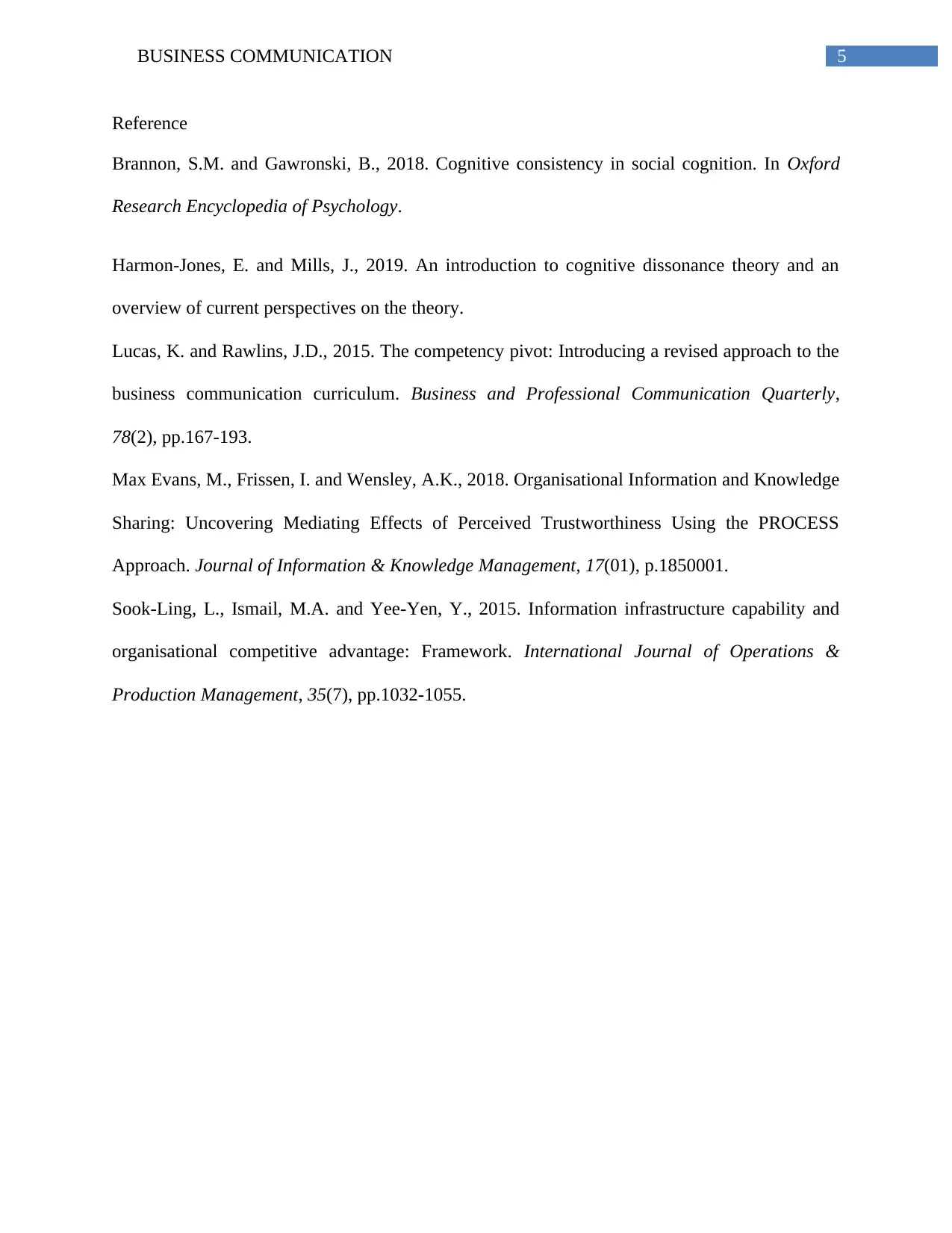
5BUSINESS COMMUNICATION
Reference
Brannon, S.M. and Gawronski, B., 2018. Cognitive consistency in social cognition. In Oxford
Research Encyclopedia of Psychology.
Harmon-Jones, E. and Mills, J., 2019. An introduction to cognitive dissonance theory and an
overview of current perspectives on the theory.
Lucas, K. and Rawlins, J.D., 2015. The competency pivot: Introducing a revised approach to the
business communication curriculum. Business and Professional Communication Quarterly,
78(2), pp.167-193.
Max Evans, M., Frissen, I. and Wensley, A.K., 2018. Organisational Information and Knowledge
Sharing: Uncovering Mediating Effects of Perceived Trustworthiness Using the PROCESS
Approach. Journal of Information & Knowledge Management, 17(01), p.1850001.
Sook-Ling, L., Ismail, M.A. and Yee-Yen, Y., 2015. Information infrastructure capability and
organisational competitive advantage: Framework. International Journal of Operations &
Production Management, 35(7), pp.1032-1055.
Reference
Brannon, S.M. and Gawronski, B., 2018. Cognitive consistency in social cognition. In Oxford
Research Encyclopedia of Psychology.
Harmon-Jones, E. and Mills, J., 2019. An introduction to cognitive dissonance theory and an
overview of current perspectives on the theory.
Lucas, K. and Rawlins, J.D., 2015. The competency pivot: Introducing a revised approach to the
business communication curriculum. Business and Professional Communication Quarterly,
78(2), pp.167-193.
Max Evans, M., Frissen, I. and Wensley, A.K., 2018. Organisational Information and Knowledge
Sharing: Uncovering Mediating Effects of Perceived Trustworthiness Using the PROCESS
Approach. Journal of Information & Knowledge Management, 17(01), p.1850001.
Sook-Ling, L., Ismail, M.A. and Yee-Yen, Y., 2015. Information infrastructure capability and
organisational competitive advantage: Framework. International Journal of Operations &
Production Management, 35(7), pp.1032-1055.
⊘ This is a preview!⊘
Do you want full access?
Subscribe today to unlock all pages.

Trusted by 1+ million students worldwide
1 out of 6
Related Documents
Your All-in-One AI-Powered Toolkit for Academic Success.
+13062052269
info@desklib.com
Available 24*7 on WhatsApp / Email
![[object Object]](/_next/static/media/star-bottom.7253800d.svg)
Unlock your academic potential
Copyright © 2020–2026 A2Z Services. All Rights Reserved. Developed and managed by ZUCOL.



